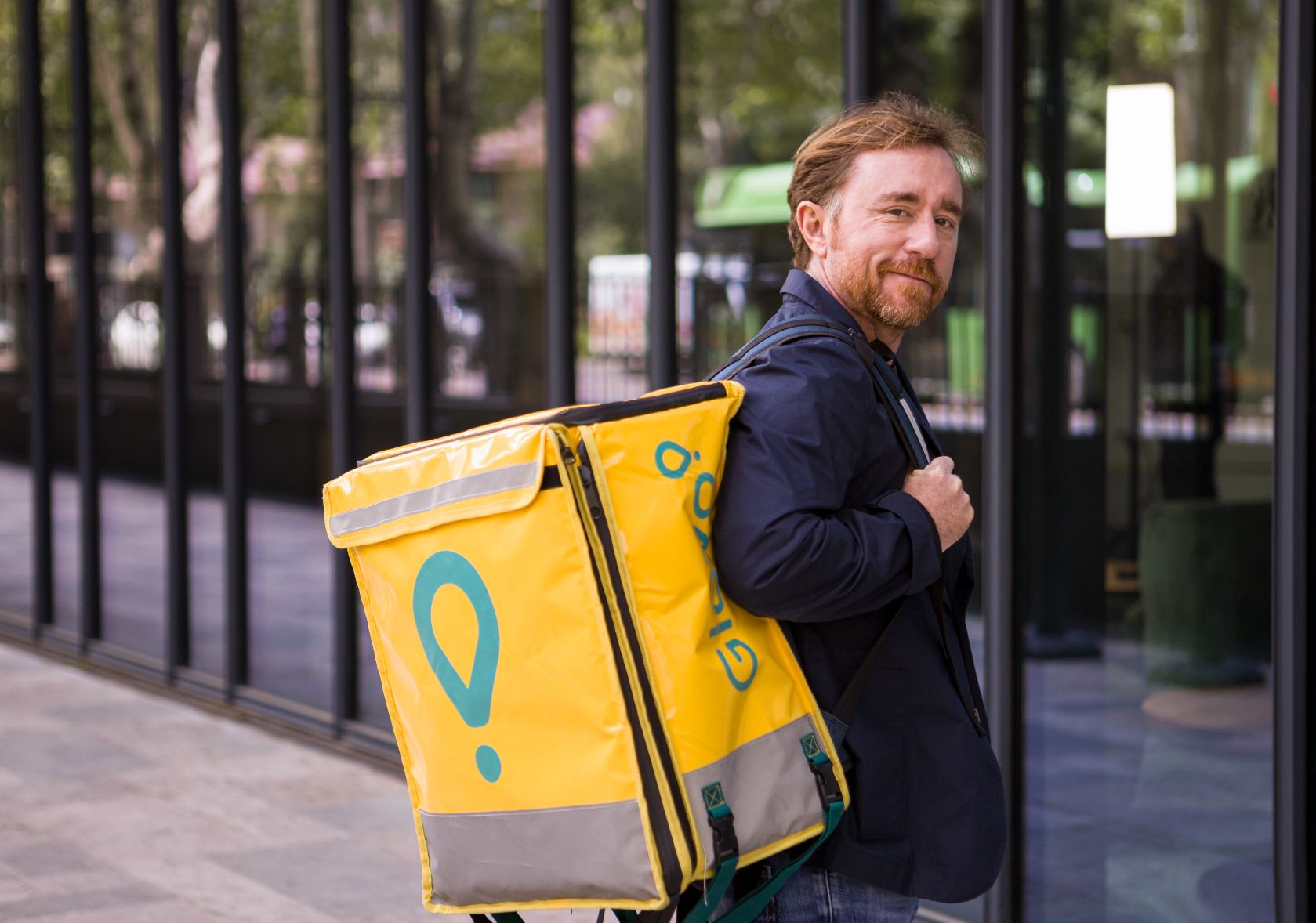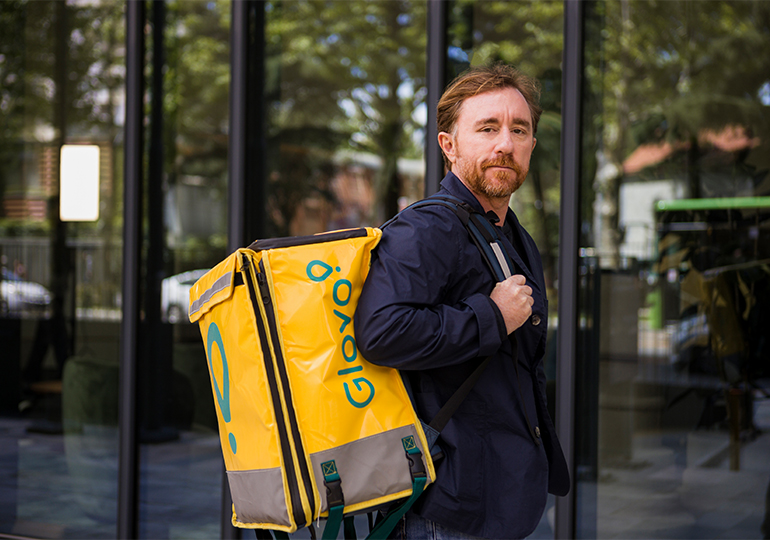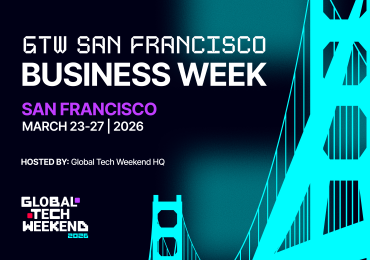Glovo’s story began when Óscar Pierre, inspired by the humble beginnings of Uber and Postmates, decided to create his own delivery company. Back then, the app was called Globo (Spanish for a balloon), but it seemed unoriginal to Óscar, who decided to swap a “v” for a “b”. Soon after, Óscar met with Sacha Michaud, who envisioned creating a similar company. The two joined forces and created one of the most well-known technology brands in Europe that transformed not only the delivery business at large but the lives of thousands of freelancers.
Today, Glovo is a multi-category delivery service that aspires to give everyone easy access to anything in each city, so that the users can enjoy what they want when they want and where they want it. Glovo’s landmark yellow boxes could be seen in thirteen thousand cities around the twenty-five countries in Southern Europe and EEMEA. Interestingly, Glovo holds leading positions in sixteen out of its twenty-five markets. Last year, the German delivery giant Delivery Hero acquired the majority stake at Glovo – the transaction valued Glovo at €2.3 billion, making it one of the most valuable Spanish companies.
I sat down to talk with the co-founder of Glovo, Sacha Michaud about his vision of the company and the challenges of the gig economy. We discussed the success of Glovo’s Georgian operations and touched upon Sacha Michaud’s appointment to the advisory board of Meta Spain. What follows is a transcript of our conversation.
Mr. Michaud, ever since its establishment in Georgia in 2018, Glovo has expanded its operations quite quickly. Today, Glovo is present in ten Georgian cities. Upon what parameters is your expansion strategy based? Where are you planning to expand next?
Whenever we launch a country – we go to the largest, most densely populated city. There are a lot of advantages of being in the cities with high density: shorter distances, a lot of stores and restaurants. At the same time, every country, every city is slightly different and has a different culture, so we must adapt. Then, once our team works efficiently, we expand into other cities. Generally, we’d go from larger to smaller as we embark. Spain would be a good example – it is the first country we ever launched, seven years ago. Today, we are in three hundred Spanish cities, including those with twenty thousand people. We are covering 80% of the population. As for Georgia, we still have room for growth, as we are only present in ten main cities.
What should we expect in the future?
Georgia is a success for us – the business here is working well. It’s a small country, so the growth is limited because the population is relatively small, but we are trying out new things here – it’s a country where we have more orders per population than in any of the other twenty five countries. This means that we can test new things out. Our vision is to give everyone easy access to anything in your city. And the key there is – anything. So, it’s not just about restaurant food. It’s not just about stores. It can be anything that you need moving around the city.
We’ve just launched a travel store in Glovo, where people can book flights, trips, and travel insurance. That’s the first time we’ve done that. We’re testing it out here in Georgia. So that’s a good example of anything in your city, isn’t it? Now we could move into ticketing, into different services as well, such as house repairs. There are a lot of things that we’d like to test and see what the customers want to use.
Mr. Michaud, how did Glovo’s establishment in the Georgian market change the local delivery industry?
Well, there are two things. One is that Glovo is very viral – the customer experience is so good that you end up using us again. Many people tell their friends: Hey! Just use Glovo to get that – so the growth is very organic. We grew very quickly here, so there is a need. Here’s a good example: Tbilisi is a lovely city, but it has terrible traffic. So if you want to go across the city to get something and there is somebody, who will bring it to you in thirty or forty minutes at pretty much the same cost as you going to get it, why wouldn’t you do that? Thus, we grew very virally, very quickly – people started seeing our yellow boxes in the city. Then, Covid came – there were lockdowns, many restaurants and shops were closed, and we became an essential service in many cities in the world, including Tbilisi.
Now we’re very set in the city – you can see our yellow boxes everywhere. Everybody knows us. We’re a very well-known technology brand here, which is great. There’s a good amount of optimism to do things and invest! We have a big team now – nearly sixty staffers in the commercial team and the office, but we also have hundred-and-twenty support staffers. We are growing a very nice business here and expect to continue growing.
Let’s talk about the pandemic. It is safe to say that the restaurant business was immensely affected by the pandemic. Would you say that many of those businesses survived painful lockdowns simply due to delivery companies, such as Glovo?
Yeah, absolutely. We’ve heard that from many of our partner restaurants and stores: we often constituted 60-70% of their income because they could not let people in, as it was either delivery or takeaway. Thus, we were an essential service for many, including restaurants, grocery shops, and pharmacies.
We did a lot of initiatives, too, with local councils. Before Covid, there were social clubs where the elderly could go and eat – all organized by city councils and NGOs. With Covid, these people should not have been leaving the house. They were in a high-risk group, especially the very elderly. So Glovo would come in and get the food from the social centers and take them to the elderly.
We are doing a lot of things around that idea. We set up Glovo Access, which is putting a platform by giving it to society – we work with NGOs and local councils. Since the launch, we’ve delivered over a million meals to the people in need. Thanks to Covid, we realized how we could be of use to cities and the people living in them.
Will you continue to do this?
Yes, it’s still going. We created Glovo Access, but it will be a continuous program financed by us. We have an internal social tax in Glovo – for every order we do, we save one cent that we use to fund social activities. Well, one cent doesn’t seem to be very much, but when you are doing fifteen million orders a month, it becomes a little bit of money that we dedicate to a social cause. We fund Glovo Access through the social tax, which allows us to offer our services free of charge to NGOs or local councils. We launched that program during Covid, but it became our most important asset alongside our team and the platform. It’s not just about the technology, but the stores, the customers and couriers, our Glovers who make everything happen. We use our app for donations, too, especially for Ukraine. We’re using our ecosystem in its entirety and putting it for social good.
How many Glovers are there in Georgia? Could you share some demographic insights about them?
There are close to two-and-a-half thousand Glovers active in Georgia. If you put that in a global context, there are seventy-five thousand Glovers active in all the twenty-five countries. The demographic is quite wide, it’s not one-size-fits-all, but generally, a Glover would be a young male under thirty years of age, looking for flexible work. Sometimes they work many hours, sometimes – less. It depends on the profile. They are generally male, but there are quite a few women, too – even more so, especially after Covid when many women lost their jobs.
The good thing about being a Glover is that, in its essence, it gives easy access to income. You don’t have to interview. You don’t have to wait for months to get a job. You only need a mode of transport, a smartphone, and a license. You can check out the platform and start working within forty-eight hours. Glovo allows easy access to income. Most important, however, is that the hourly earnings are decent, and if you work enough hours, you could have a decent income.
Are there enough Glovers to serve the demand, or would you like to expand your fleet?
It often depends on the time of the year and the weather, but we are expanding and onboarding Glovers regularly every week. We are growing at around 35-40% in Georgia, so we require every part of the business to grow. We are bringing on stores, partners, and restaurants. Content is also very important for our business – we should have an offer for every type of client. Some want the big chains, but others their favorite restaurant – we must cater to all that.
The neighborhood distances are also crucial. The closer the restaurant or the store is to the customer, the more efficient everything is. The order will come much quicker, so customers have a better experience. The courier can fulfill more orders per hour, so he will have a higher income and help the whole ecosystem work better. That’s why it is important to expand and ensure we get all the partners, not just restaurants but grocery shops and retailers.
Mr. Michaud, last year, Glovo launched Couriers Pledge, which is Glovo’s commitment to setting a new standard for a fairer gig economy. Interestingly, Georgia and Morocco were the two countries where the Pledge rolled out. What was the motivation behind the Couriers Pledge, and why did you decide to roll it out in Georgia?
It’s a new initiative. It’s a new initiative across the gig economy. I don’t think there is any large-scale gig economy company that has made that commitment. We work with a UK-based organization called Fair Work – they are an impartial group from Cambridge University that analyzes the gig economy worldwide. I think they are the leading voice in Europe, too. They are going to audit how we evolve this initiative. It’s a two-year plan, so we have just started. As we are speaking, we are also launching the Couriers Pledge in the three Balkan countries. We are expanding it.
We identified Georgia as an ideal place for the Couriers Pledge because the regulation here is very positive. It allows for flexibility. Generally, giving the couriers more social rights is quite limited in many countries. If you are an autonomous or a freelance worker, companies cannot present more benefits to you unless they establish a labor relationship. So, Georgia and Morocco are the two countries that we thought would be a great place to start – these are the countries that are working very well for us. They have happy fleets.

The Couriers Pledge means that independently of how you work with us, whether you have a labor contract, work through a third party – we use third-party net courier companies in many countries – or freelance, you will have some basic guarantees. These are certain guarantees per hour, holiday coverage, sick days, and maternity-paternity leave so you can take some time off. The gig economy work platform has a lot of good things about it, but it has some gaps, too. I don’t think it is justified when a worker is not feeling too well but he must do his job anyway because he needs the income. When we work in the office and have a fever, we are not worried we are not getting paid. Some things that are required to equal the playing field. It’s the first step. It’s difficult, too, because the regulation cost is high, and there are many operational things we must navigate through. I think the regulation will end up going there anyway.
Mr. Michaud, Glovo, and other delivery service providers operating with similar labor employment models are experiencing substantial regulatory pressure, with one of the main precedents established by the Spanish Supreme court in 2020. Considering these regulatory and other economic and financial challenges that have arisen in the near past, including high inflation rates and a possible food shortage, what short- and long-term outlook do you have for Glovo, both for Georgia and globally?
I think that this is a long-term game for us and our competitors. Now Delivery Hero is our main shareholder – it’s a massive company present in many parts of the world. High inflation, food shortages, gasoline and petrol prices going up and down every decade. We can’t focus on short-term fluctuations. At Glovo, we are primarily focused on growth and want to be EBITDA-positive within two years by 2024. We’ve got a runway to do that, but we still believe in it.
So, to answer your question. Look, it’s tough. It’s a tough business with a lot of competition and minimal margins. You must make many things work. It’s very complex. We must have enough restaurants and stores and make sure the commissions are fair so that they can generate income. We must charge the customer delivery fee, but it must be precise because if we charge too much, they will stop ordering. We must ensure that there are enough orders in the city so that our couriers have enough orders per hour to have a decent income. All of this must work.
Then, you have a very aggressive competitor that, sometimes, has more money for promotions and discounts. It’s a tough business, but we have a long-term vision. We think that these services are super helpful and will continue growing even beyond restaurants. Restaurants are to Glovo what books were to Amazon. In the next few years, as people realize that, well, I can order hot food and essential groceries but a t-shirt, as I do not want to wait for three days for it. The digitalization of retail, especially in small businesses, will present a growth opportunity in the next five years.
Are you considering a Super App strategy for the long haul?
We should focus on moving things around the city first. For me, a Super App could be anything from transportation to services, but honestly, at this phase, our focus will be on moving things around the city. I see our relationship with stores, restaurants, and retail outlets as follows: you have a need, but you don’t necessarily want to move from where you are – that’s where Glovo comes in. Our courier service is frequently used for sending things between offices. That’s what I see in the short-term, but the customer is the king, so they will tell us what they want.
What about delivering bigger things?
We have a very important part of the business, called logistics as a service, through which companies use us as a logistic service. It’s growing significantly and will continue to do so. We could move into bigger things, where we have not only motorbikes but also vans. We will probably work with many retailers who sell bigger things, such as fridges, for instance, but we might not be the ones to deliver it, as the fridge store might have its delivery service. Thus, we will be the enabler ensuring that the fridge gets there. We might help them with tracking, too. For now, the customer would call them and ask about the location, but in Glovo, customers can see where their fridge is, the same way they track their hamburgers.
Mr. Michaud, apart from Glovo’s expansion within Georgia, the company has expanded its services to Armenia. Do you see Georgia as Glovo’s regional hub?
Not yet. The local team is focused primarily on Georgia. We have recently launched our business in Armenia at the end of Q3 of the last year. It’s a new market for us. Today, Georgia’s ten times the size of Armenia as far as business is concerned, so there will probably be many synergies between the two teams. Georgian team is very mature – we’ve made all the mistakes and learned from them. I think there will be many things we can do from Tbilisi, as the local team can impact the other recently launched countries. Our Georgian business is four years old, so it is the most mature country in the region after Ukraine.
There is another subtle parameter to Glovo’s Georgian success – the development and promotion of Georgian talent on a global scale. Glovo Georgia’s Head of Operations, Giga Demetrashviliwas promoted to the Operations Director of Eastern Europe, Caucasus, and Northern Africa. What are the roots of such success?
Giga is a great professional. He was doing an excellent job here. He helped to build the foundation of what Glovo Georgia is today. Operationally and effectively the local team has built a great business here. They are the ones who did it, it’s always down to the local team, and Giga was a crucial part of that. Then there was an opportunity for him to grow within Glovo, and luckily for us, he took it. I run into him pretty much every day in the Barcelona HQ. He is very talented.
There are many talented individuals here that can either grow in Georgia as we grow, because the business is getting bigger or travel within the company and go to headquarters or other offices. We want to promote talented people that want to find something they want. It’s not one-size-fits-all, especially in Tbilisi – many people love staying here and do not want to move. It’s an amazing city. There are many other cities that people want to move from, but typically people love to live here.
How would you rate the preparedness of the Georgian labor force to work in an international company, such as Glovo?
I have been impressed by the Georgian professionals I’ve met, not just from the Glovo team but entrepreneurs. There is energy and drive in Georgia. What is needed is acceleration in examples – the country needs big and successful Georgian companies that young people admire. People need role models. What we see here is the birth of a startup and tech ecosystem. There will be surprising success stories that will motivate people to set up companies. I think Georgians are very humble about how talented you are. I don’t think you realize how good you are.
What advice would you give to the young Georgian entrepreneurs?
If you have an idea, you should go for it. The worst that could happen is that your project fails – and most startups fail. There is nothing wrong with that because whatever you learn in that year or two, or however long it takes, will be more than you would have learned by working for someone else. It will be a win. You can take that knowledge and set up another venture. I know so many entrepreneurs whose first project did not work, but they built another, incorporated all this knowledge, and did things differently so that it worked. I do not know anyone who set up a project and regretted it.
Go for it. Surround yourself with good co-founders. It’s very difficult to build a project by yourself. It’s super tough. I’m not saying that it’s tough to create it, but there are ups and downs, and you need somebody to help you through them. It’s not always great. We’ve had some tough times in Glovo: we had a difficult time fundraising, we couldn’t pay the employees, and had to put our money into the business. If I didn’t have Oscar [Pierre] with me, we wouldn’t be here. Surround yourself with good co-founders. Go for it. Take risks and focus on a few good things – don’t try to do too many things. Don’t build the perfect company, the perfect software, or the perfect app. It does not need to be perfect. Get it out there. Test it, learn, adapt, and focus on a few things.
Mr. Michaud, we at Forbes Georgia are very humbled and immensely honored to be one of the first media outlets in Georgia to announce that you have joined Meta Spain’s advisory board. What will you bring to Meta’s table?
I think they asked me to join because I have helped build one of the largest Spanish scaleups, one of the first Spanish unicorns. As a founder, I’m quite unique, as I have had quite a lot of regulatory experience with public administration, which is very important for Meta. The third most-highly ranked person in the company oversees the global policy. The Spanish market is crucial for Meta, as a big part of the platform is built out of Spain – they have assembled a team of two thousand engineers for that purpose. I hope I can bring some value.
What are the points of contact between Meta and Glovo? Shall we expect some meta-dimensional collaborations between the two?
We are a big advertiser on Facebook and Instagram, so we already work together. This relationship, however, is between Meta and me rather than Meta and Glovo. We are looking at it from the perspective of the value that I can bring, including insights on regulation and public policy. We are building very disruptive things at the tech companies, but we do not think about everything. That is normal, as we are moving very quickly. If you thought about everything, you would never build anything. So, there is a bit of thinking on Meta’s part to ensure that everything is going well.
What is your take on the metaverse?
We are moving in that direction from a technology perspective. It makes a lot of sense that in a few years, we do not have a phone in our hands while walking in the street, but glasses. We have our phones with us all the time. I believe that there is a more interactive world in which it is easier to communicate through voice and movement.
Well, metaverse already exists on gaming platforms. We are not inventing anything new. It’s already happening. People are online; they interact, buy things, and use them in games. So, to a certain extent, this is already happening in other environments. It’s an interesting process. I think it will move a bit slower than what many people think. We will still have mobile phones in a couple of years.
Who will own that, and where will that go? It depends. It’s difficult for a single company to be a platform for everything – society’s very cautious about that. I think it will be something bigger with a lot of companies involved – like the Internet, which is owned by nobody.

















